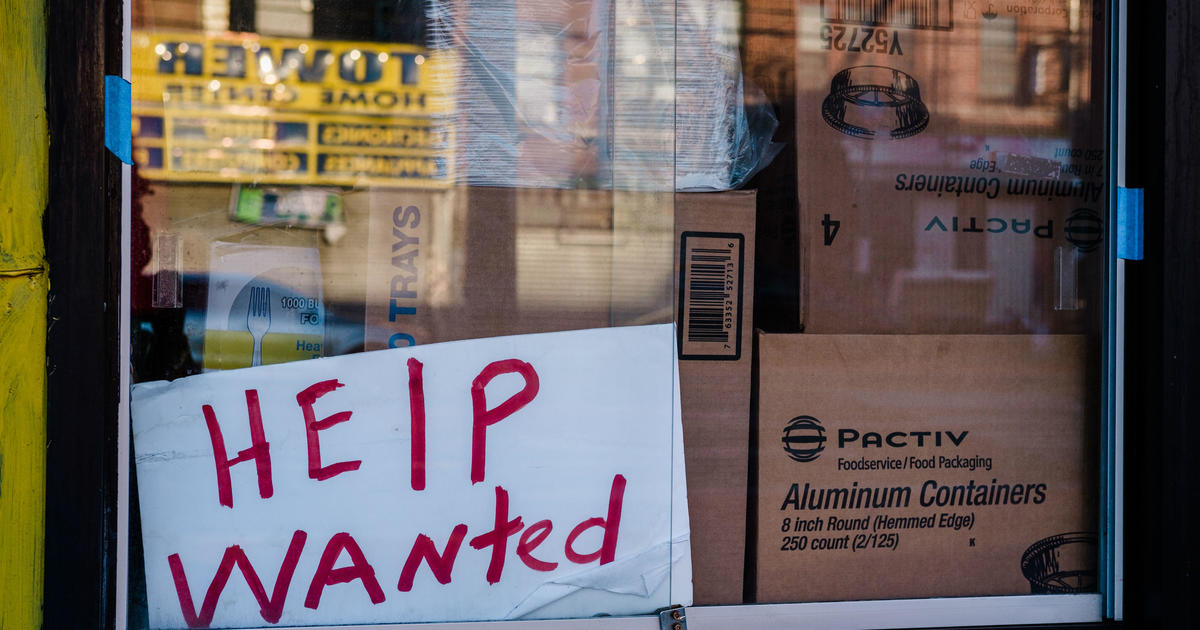The Great Resignation: Why more Americans are quitting their jobs than ever before – 60 Minutes – CBS News
Watch CBS News
By Bill Whitaker
January 9, 2022 / 7:39 PM / CBS News
We’ve all seen signs in front of shops, restaurants, and factories: “we’re hiring!” “Help wanted!” And now, the Omicron variant is taking a toll on the already depleted workforce. We’ve wondered how there can be so many open jobs when nearly every employer seems to be offering better pay, benefits and even signing bonuses.
The government’s jobs report released this past week tells us what has happened: well over 20 million people quit their jobs in the second half of 2021. Some are calling it the “big quit,” others the “great resignation.”
But who can explain why this is happening? We found the best place to look for real-time answers is the huge online job site LinkedIn, which calls itself the world’s largest professional network.
Karin Kimbrough: People have been living to work for a very long time. And I think the pandemic brought that moment of reflection for everyone. “What do I wanna do? What makes my heart sing?” And people are thinking, “If not now, then when?”
Karin Kimbrough is LinkedIn’s chief economist. She has degrees from Stanford and Harvard and a Ph.D. from Oxford, used to work for the Federal Reserve, and now has a birds-eye view of the U.S. labor market.
Karin Kimbrough: We have this unique view of the data. We can see across millions of members and what they share with us, and we can see from employers, millions of them that are posting jobs on our platform. There is one person hired every 15 seconds right now on LinkedIn.
But LinkedIn’s data on who is leaving jobs is most compelling: millions of baby boomers retiring early, but also millions of “Gen Z” workers – people in their teens and early 20s. Many more women than men. In all, the highest “quit rate” since the government started keeping track two decades ago.
Karin Kimbrough: At the nationwide level the number of Americans quitting their job is higher than ever.
Bill Whitaker: Higher than ever?
Karin Kimbrough: Higher than ever.
Bill Whitaker: Do the data tell you why?
Karin Kimbrough: We can see what sectors people are quitting. Retail sectors and hospitality sectors. It may not just be worth it for some folks. And so in some cases people are quitting and they’re not yet returning. They’re taking a break. Americans are burnt out. I like to think of it as– it’s a, “Take this job and shove it,” measure. It’s just a sign of people saying, “You know, I don’t need this.”
Bill Whitaker: “I’m out.”
Karin Kimbrough: “I’m out.”
The most recent data show people quitting jobs across the board: 4.4% of all positions in education are open, over 6% in retail, and more than 8% in health care. Open jobs in hotels and restaurants are nearly 9%. That’s almost a million-and-a-half vacant positions.
Carl Sobocinski: We do have openings, and we do need more employees.
Carl Sobocinski owns several restaurants in Greenville, South Carolina. He needs workers both in the kitchen and out front waiting tables.
Bill Whitaker: What’s the biggest challenge in– in attracting them and– keeping the employees?
Carl Sobocinski: It’s a problem that they’re just not out there. Where we are, we just don’t have the workers out there looking for the jobs.
Construction is another sector without enough workers; at last count there were nearly 350,000 open construction jobs nationwide.
Bill Whitaker: You’re finding it more difficult to find people right now–
James Jordon: Absolutely.
Bill Whitaker: –across the board?
James Jordon: Across the board.
James Jordon owns a fast-growing construction company in Greenville.
James Jordon: We doubled our revenue year over year. We don’t have a work problem at all, now it’s just a matter of finding– the individuals to be able to do– perform the work.
Bill Whitaker: So it’s not a work problem, it’s a worker problem?
James Jordon: It’s a worker problem.
We came to Greenville, South Carolina, after seeing it on a LinkedIn data map showing trends of geographic migration. Lots of workers leaving big cities like San Francisco and Chicago and lots of workers moving to places like Austin and Miami… and Greenville.
Bill Whitaker: That’s another big sign of this job market. People are moving.
Karin Kimbrough: A lot of people are just opting because of affordable housing costs to choose more affordable places, smaller cities that give you more space, will feel safer. And people are willing to try something new.
For what you’d pay to rent an apartment in San Francisco, you can buy a nice house in Greenville. It has attracted big employers like BMW and Michelin, but also tries to nurture small businesses and start-ups.
Still, you see all the same “help wanted” signs on Greenville’s main street as you would in any big city. Many people believe that generous government stimulus and unemployment benefits are really what’s keeping so many workers on the sidelines, no matter where they live.
Carl Sobocinski: The quick answer people say is we’re still providing too many benefits, and too many people can sit at home and– and get a check. I personally disagree with that. Our associates that didn’t come back, They’re not sitting at home. They found other careers, other opportunities, that fit their lifestyle better.
Karin Kimbrough: What we saw was that when these benefits were turned off, when workers were no longer getting the benefits, they did not rush back to work.
Bill Whitaker: What does that tell you?
Karin Kimbrough: That tells me that it’s not just a function of the benefits. That’s not the only thing that’s going on in the heads of workers when they make that calculus about, “Should I go back? Will I go back, and f– for what job?”
Bill Whitaker: So is all of this producing– a fundamental shift in the balance of power between employers and employees?
Karin Kimbrough: It’s as if that social contract of work is being rewritten, and right now the worker’s holding the pen. There are just thousands upon thousands of available jobs in America right now. And companies are eager to hire. But workers are being very choosy.
Bill Whitaker: So employees are kind of in the driver’s seat?
Karin Kimbrough: Employees are in the driver’s seat right now.
Workers want better pay and benefits, of course, but they’re also demanding autonomy and flexibility, particularly in their work schedules. And employers – large and small – simply have to respond.
Carl Sobocinski: I think flexibility’s critical.
Bill Whitaker: This is the employees’ demand.
Carl Sobocinski: The employees, they want flexibility. And if you’re an employer that won’t– that won’t work with your employees to– to be flexible with them, then you’re gonna be– you’re missing out. I mean, you have to.
Bill Whitaker: So is it the case that gone are the days where an employer would say, “You’re just lucky to have this job”?
James Jordon: I– I think so. I think so, and I think it’s for the better.
James Jordon’s construction company will pay an employee’s tuition if they want to continue their education and their moving expenses if they relocate. And like so many employers, he’s offering signing bonuses and flexible hours to new hires.
Bill Whitaker: I understand there was one young man, one young recruit that you called every day for two months?
James Jordon: I did (LAUGH).
Bill Whitaker: (LAUGH) You really wanted this young man–
James Jordon: I did. I did.
Bill Whitaker: Did you finally get him?
James Jordon: I finally got him. He started last week, Monday.
What a stunning turnaround from the spring of 2020, when the pandemic essentially shut the economy down.
Karin Kimbrough: We had never seen anything like it. When you lose 22 million jobs in just two months — and it’s unthinkable.
Kimbrough remembers that working mothers were, and still are, among those hardest hit, as the pandemic robbed them of many of their child-care options.
Karin Kimbrough: What we’re seeing now is actually a really great story of resilience. Because we’re seeing more and more women come back into the workforce. We’re still missing a few million women, by the way, in the workforce. We’re not fully there.
Bill Whitaker: Still?
Karin Kimbrough: Still missing a few million women. But we’re seeing them come back. And predominantly the women that were missing are parents of young children. They were hit the hardest.
Melissa Williams: I just decided to leave. I had nowhere to go. I had no hopes for employment. Luckily, my husband was gainfully employed and I was able to do that. But I just walked away.
Melissa Williams walked away from a marketing job in Greenville in early 2021. When the pandemic hit, she was balancing marriage, motherhood, and her career.
Bill Whitaker: You know, you’re part of– a trend.
Melissa Williams: Yes.
Bill Whitaker: There’s, like, a fundamental shift–
Melissa Williams: The great resignation. (LAUGH)
Bill Whitaker: People who are saying and doing what you did. “I– I– I can do better than this. This isn’t– this isn’t fun. This isn’t me.”
Melissa Williams: Like you said, I hit a wall and I was done.
Bill Whitaker: Was that difficult? I mean…
Melissa Williams: It was. It was very scary. ‘Cause I had– I’ve been employed since I was 17 years old. I remember going home after I put in my resignation and– and I just sat there on the couch and I was like, “What did I just do? I just quit my job. I have no job to go to. We have bills. We have a child. We have responsibilities.” And my husband’s like, “You wanna go for a walk?” It’s like, “Well, I don’t have anything else to do.” (LAUGH) So we went for a walk. (LAUGH)
Kenzie Biggins: It is challenging to go say “I’m gonna go out on my own,” in general. It really does take some work. But people wanna have control.
Kenzie Biggins moved to Greenville in 2017, a few years after she founded “Worxbee,” which pairs remote assistants with executives and companies that need administrative help.
Bill Whitaker: You find executive assistants all over the country and you team them up with executives and companies also all over the country?
Kenzie Biggins: Yes.
Bill Whitaker: So one can be in Greenville and an executive can be in Chicago.
Kenzie Biggins: Yeah. It’s all about the best pairing for you.
Kenzie had the idea for Worxbee years before the pandemic made such arrangements common.
Bill Whitaker: You were ahead of the curve, and then the curve caught up. (LAUGH)
Kenzie Biggins: Let me just say this, I got a lotta crazy looks for a very long time, you know, walking into places and saying, “You should have a virtual executive assistant.” People looked at me like I had five heads. They were, like, “What?”
Bill Whitaker: Pandemic hits and all of a sudden, you’re a genius.
Kenzie Biggins: We went from closing three to four people a month, to closing ten to 18 people per month, which is quite the jump, (LAUGH) in trying to get people paired, and bring in new EAs.
Karin Kimbrough: Americans have really taken a liking to remote work. They’re two and a half times as likely to apply to a job that’s remote versus a job that’s not remote.
Bill Whitaker: How’s that different from pre-pandemic?
Karin Kimbrough: So pre-pandemic I think one in every 67 jobs was a remote job.
Bill Whitaker: And now?
Karin Kimbrough: And now it’s one in seven.
Bill Whitaker: One in seven?
Karin Kimbrough: One in seven jobs is remote now. It’s huge–
Bill Whitaker: That’s a huge shift
Karin Kimbrough: Huge rise in m– and I think what it is, is that companies have realized that if they want to attract candidates they kinda need to meet them where they are now.
Melissa Williams: Worxbee found me at the most opportune time.
Two months after quitting her office job, Melissa started with Worxbee. She’s now an executive assistant for three organizations.
Bill Whitaker: You’re working for three different bosses–
Melissa Williams: Yes. Uh-huh (AFFIRM).
Bill Whitaker: From home.
Melissa Williams: Uh-huh (AFFIRM).
Bill Whitaker: All virtually.
Melissa Williams: Yes.
Bill Whitaker: It sounds like you could be just as busy as you were before.
Melissa Williams: I am. I am just as busy. The difference is, it’s my choice.
Bill Whitaker: Now you have a fourth job?
Melissa Williams: I do. (LAUGH) I do. I am also an English instructor at Greenville Technical College.
Bill Whitaker: Worxbee and the ability to design your work life, does that make it possible for you to now enjoy what seems to be your passion?
Melissa Williams: Absolutely.
Bill Whitaker: To teach English.
Melissa Williams: Absolutely. If it had not been for Worxbee, I would have never been able to even give this a shot.
The pendulum of power may soon swing back toward employers, especially as workers who’ve quit their jobs deplete their savings. But Karin Kimbrough expects employees to cling to the flexibility they’ve fought for.
Karin Kimbrough: I think actually that this trend towards having more flexibility could be permanent.
Melissa Williams: I honestly can say I don’t see myself going back to an office ever. And that–
Bill Whitaker: Ever–
Melissa Williams: Ever. Honestly, there is no office that could offer me what I have in my house. It’s just not possible.
Produced by Rome Hartman. Associate producer, Sara Kuzmarov. Broadcast associate, Emilio Almonte. Edited by Patrick Lee.
For Breaking News & Analysis Download the Free CBS News app
First published on January 9, 2022 / 7:39 PM
© 2022 CBS Interactive Inc. All Rights Reserved.
Copyright © 2022 CBS Interactive Inc. All rights reserved.



